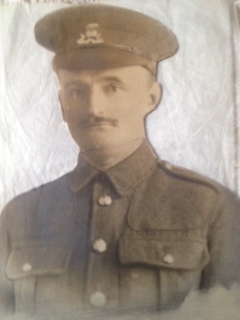
Ernest Butterworth (photo from private collection)
Ernest Butterworth was my maternal great-grandfather, born in 1877, the son of John Butterworth and Susan Butterworth, nee Jackson. He was the second youngest of seven children and born in Wardle, a village near Rochdale in east Lancashire, in the Rossendale Valley. His parents, like many in the area, worked in the cotton mills, his father was a cotton loom jobber and his mother a cotton weaver.
Rossendale towns, with a ready supply of fast flowing water, were ideal for cotton spinning and local mills by river banks were a common feature in the 19th century. At its peak, the area was producing some 68 million pounds of yarn and 210 million yards of cloth each year. Ernest was himself a Cotton Operator by the age of 13. By 1901, he was a Stone Quarry Man, and the family had moved to Whitworth, a small town situated between Bacup and Rochdale. Ten years later, the 1911 Census records him as returning to the occupation of Cotton Weaver, living in accommodation with only two rooms in the nearby village of Shawforth with a wife, Isabella, and five children. They would go on to have eight in total children, born between 1904 and 1915.
Working in the cotton mills was a dangerous, noisy and dirty experience, despite the introduction of various Factory Acts to improve conditions from the 1850s. The air in the mill had to be hot and humid to prevent the thread from breaking. 65 F to 80 F and 85% humidity was normal. The air in the mill was thick with cotton dust. Protective masks were not introduced until after the First World War and without them there was a high risk of developing breathing difficulties and lung diseases, as well as skin and eye infections and tuberculosis. Intense high noise levels could lead to deafness for those who worked in the mills over a long period of time. Typically, a mill worker could expect to work for 13 hours a day and six days a week.
These conditions may help to explain why Ernest, at the age of 38, decided to join the Army reserve on 12 December 1915. Recruitment had been high at the start of the war but started to fall by late 1915. At this time, it was unusual for someone to volunteer at such an age, and there is no evidence of previous army service in Ernest’s family history. Ernest was also relatively short at 5’ 4½”, so not your average soldier.
His service records show that in April 1917 he was posted to France with the 16 Battalion of the Lancashire Fusiliers. He spent only two months in the trenches, before being hospitalized on 24 June 1917. The entry in the war diary, available to download with the reference WO 95/2397/4, on the previous day, read, ‘Relieved by 1st Battalion Black Watch and marched to Jean Bart Camp Coxyde-Bains, Belgium. The casualties during the tour of the trenches was 1 officer wounded, seven other ranks killed, thirteen other ranks injured’. Ernest returned home in September 1917. He spent 66 days in hospital suffering from insomnia, sluggish reflexes and severe headaches, memory lapses, with ‘….no interest in his surroundings’. He was discharged on 20 September 1918 at the age of 41. His discharge notes state feeblemindedness in the Disease column.
Clearly traumatised by war like so many men, Ernest never fully recovered. Many of the symptoms he experienced are symptomatic of shell shock. He died at the age of 44 on 27 December 1921. His youngest child was only six. His widow, Isabella, would go on to live for another 46 years, without remarrying. I very recently received a copy of his death certificate. Cause of death was recorded as intestinal disease of the kidney and urenia. Urenia is linked to renal disease which was the cause of deaths of many who worked in cotton mills and exposed to tiny particles of cotton dust.
hi could this be my relative granda george butterworth of whitehaven cumbria and houghton-le-spring co durham england x
Hi Karen
I’m afraid this is unlikely. I have extensively researched this branch of the Butterworths and they very much lived and settled in East Lancashire.
Hi, I wonder do you have any of the names of his children? I’m looking for information on an Ernest Butterworth from Rochdale who is my late grandfather.
Hi my grandfathers name was Ernest Butterworth. He was a chrome in Bolton. I think he was named after his father. I wonder if it could be him. My Dad said he never knew his paternal grandfather.